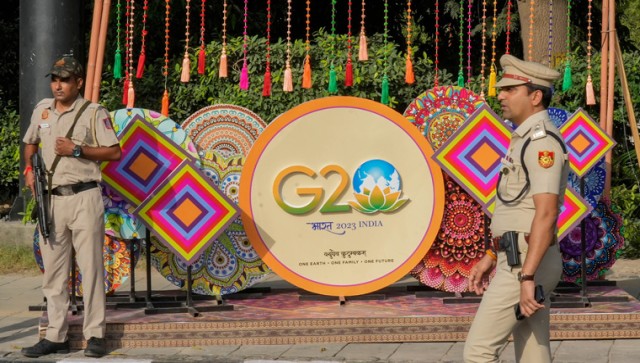This next weekend, Delhi will host the high-profile G20 summit. Extensive security measures have been made to ensure the unhindered travel of the leaders of state of the largest economies in the world and other attendees. Delhi Police has chosen Sandes, an Indian instant messaging service, even for communication security breaches, according to Indian Express. Here’s all we know about the app. Also read: G20 Summit: How to travel in Delhi? What’s allowed and what’s not? Delhi police to use ‘Sandes’ app From inspectors to commissioners and police officers in Delhi, everyone is using the Sandes app to discuss sensitive information about dignitaries, the locations of the summit and other events, the routes that these dignitaries will travel, and other details. The Delhi Police, according to information obtained by Indian Express, issued an order in this regard a few days ago. In it, it was stated that officers had been seen sharing information about the G20 arrangements, including the point-to-point movement of VIP carcades, on groups on messaging apps like WhatsApp, Facebook, and X (formerly Twitter), during rehearsals for the event. [caption id=“attachment_13082122” align=“alignnone” width=“640”] An installation put up near Rajghat in preparation for the upcoming G20 Summit, in New Delhi. PTI[/caption] Police claimed they do not want to take the chance of a security breach. “We have made all security, traffic, and other arrangements. Now, our prime target is to secure information. On this app (Sandes), if you are a user, you can only access (information) and cannot forward it to anyone whose number is not registered on the app. Inspectors to Special CP-rank officers have been asked to download this app for all G20-related communication. Information to all constables to sub-inspectors will be shared verbally,” the officer said, adding, “All police personnel have been warned that violation of the direction will be viewed seriously by senior officers of Delhi Police.” According to a senior police officer, an official from the National Informatics Centre (NIC) visited the Delhi Police headquarters approximately 20 days ago to give a presentation to senior police officers and Delhi Police Commissioner Sanjay Arora. Also read: Rig Veda, Mona Lisa, and Magna Carta: The Culture Corridor on display at G20 summit About the app The mobile application, developed by the National Informatics Centre (NIC), was launched in August 2020. The app, an upgrade to the Government Instant Messaging System (GIMS), has undergone major updates making the platform more secure. GIMS was created for government officials only to provide them a messaging software similar to WhatsApp. However, the Sandes app provides versions for Android, iOS, and desktop for both individuals and government employees. The app enables safe information transmission. Users can only access the documents they share on the app as they do so over a secure internet protocol. A message can be marked as Confidential, on Priority, or Auto Delete, according to the Sandes platform’s official website. [caption id=“attachment_13082582” align=“alignnone” width=“640”]
Developed by the National Informatics Centre (NIC), Sandes app was launched in August 2020. News18[/caption] According to NIC, the Sandes app is hard to hack and the documents transferred between users cannot be duplicated by any other user because individual and group chat communications are end-to-end encrypted. On police officers’ government-issued phones, not their personal devices, it has been downloaded. Earlier this July, the AIIMS-Delhi also introduced Sandes for all staff members to communicate among themselves at the premier medical institute to streamline the healthcare work. The move aimed at enhancing collaboration and streamlining communication within our esteemed organisation, AIIMS Delhi director Dr M Srinivas said. Also read: G20: How India has walked the talk on Global South How to sign up All you need to join up for Sandes is your phone number or email address. You will receive a six-digit OTP for authentication after entering your phone number or email. After registering, you can change your profile and choose a status update similar to WhatsApp. It contains capabilities that are almost identical to WhatsApp, from establishing groups to sending multimedia material. Also read: G20 Summit: Why a joint declaration is unlikely Difference between WhatsApp and Sandes The two chat apps differ in a few other ways as well. For instance, if one prefers not to use their phone number to join up for Sandes, they can do so using their email address. WhatsApp, however, needs a phone number. You can send chat backups from Sandes to any external site, including an email, of your choice. On Android and iPhone, the only backup locations for WhatsApp chats are iCloud and Google Drive. Once you’ve signed up for Sandes, you cannot modify your mobile number or email address. If you decide to do so, you can either close the current account and open a new one, or you can open a new one using a different phone number or email address. A specific “Change Number” feature is available in WhatsApp. With inputs from agencies
The Delhi police is using the Sandes app to discuss sensitive information about dignitaries during the G20 summit. Developed by the National Informatics Centre (NIC), it is an upgrade to the Government Instant Messaging System (GIMS). It has undergone major updates to make the platform more secure
Advertisement
End of Article


)

)
)
)
)
)
)
)
)



